As a follow-up to my recent blockbuster article (viewed nearly 3,000 times just in Feb. 2014 in 50 countries around the world – WOW!), Can Cavities be Cured, I’d like to talk about how you can decrease your risk of getting cavities, since I think we can all agree (holistics and conventional medicine followers alike) that prevention is by far the best. The thing is, there are so many choices, how in the world do you choose!?
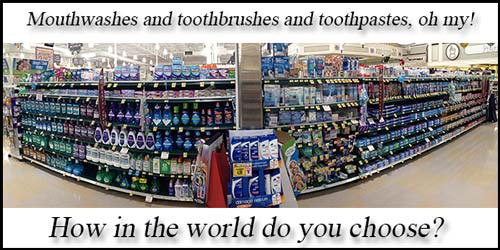
What Toothbrush Should You Use?
Back in dental school (UNC Chapel Hill School of Dentistry ’98), I still remember one of our professors giving us the following information:
A properly used manual toothbrush can do as good a job as an electric toothbrush; the problem is that most people don’t use a manual toothbrush properly.
In all of my almost 16 years of experience in full-time, private practice dentistry, I have found this statement to be perfectly on target. The simple fact is, no matter how many times a dentist or hygienist reviews the proper way to brush, most people don’t do it that way. Why? One simple reason – although this is my opinion only, not something that’s been studied AFAIK – when you’re in a rush to brush in the morning or before bed, you grab the brush and start scrubbing away and get the teeth done as fast as possible before running out the door or going to bed. Am I right? Of course I am! So what do I recommend?
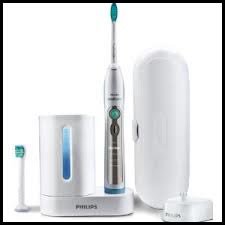
Why do I recommend the Sonicare Electric Toothbrush? Let’s count the reasons:
- An automatic timer with a beep every 30 seconds so you brush for 2 minutes
- A pressure sensor to automatically cut off if you’re brushing too hard
- The sonic wave created by the bristles extends beyond the brush tips, so the effect gets in between your teeth
- The brush does the work for you; you just slowly move it around
- The best model includes a UV Sanitizer to disinfect the brush head after you’ve been sick
- It includes 2 brush heads, so 2 people can share it
What Toothpaste Should I Use?
When it comes to toothpastes, pretty much any one that contains fluoride will do fine. Crest, Colgate, Aquafresh, Sensodyne, Tom’s…..they’re all good. As a general rule, I do recommend Sensodyne Pronamel for particularly sensitive teeth, but if you’re looking for something over the counter, get whatever you like – as long as it has fluoride!
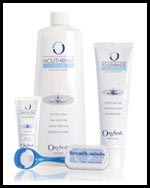
Now, if you want what my family and I use, then you want to see us to buy some Oxyfresh Toothpaste, either the Lemon Mint (yummy!) or the Fluoride (if you’re more prone to cavities). Oxyfresh toothpastes are terrific at fighting bad breath, or halitosis, as well as providing the needed fluoride to keep your teeth strong. In addition, both kinds of Oxyfresh toothpastes use the sweetener Xylitol, which can’t be used by bacteria to produce damaging acids. Oxyfresh Products can usually only be purchased through a dental office, though.
Do Whitening Toothpastes Really Work?
You know, some people do seem to get some benefit from these toothpastes, but usually only if their teeth are already pretty white and they only have some minor surface stains from coffee, tea, etc. If you really have dark or stained teeth, then the answer is no, a whitening toothpaste really won’t help much.
What Mouthrinse Should I Use?
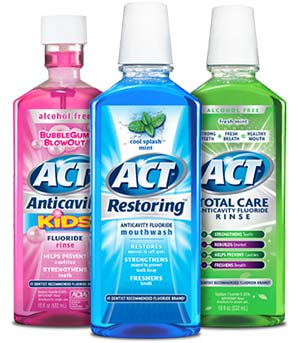 If you’re looking for something over-the-counter, my recommendation is ACT Restoring Mouthwash, as seen here. This fluoride rinse seems to work quite well, and it does NOT contain alcohol, unlike many other mouth rinses. Did you know, for example, that Listerine contains 40% alcohol by volume? That’s nearly as strong a whisky! And the thing is – if you don’t use Listerine at full strength for a full 60 seconds, it really doesn’t help much. Have you actually tried rinsing full strength Listerine for 60 seconds? I can’t do it – it burns too badly!
If you’re looking for something over-the-counter, my recommendation is ACT Restoring Mouthwash, as seen here. This fluoride rinse seems to work quite well, and it does NOT contain alcohol, unlike many other mouth rinses. Did you know, for example, that Listerine contains 40% alcohol by volume? That’s nearly as strong a whisky! And the thing is – if you don’t use Listerine at full strength for a full 60 seconds, it really doesn’t help much. Have you actually tried rinsing full strength Listerine for 60 seconds? I can’t do it – it burns too badly!
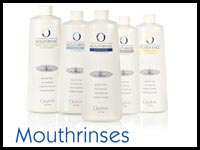 Once again, though, my personal recommendation (excepting ACT for people with lots of cavities) is the Oxyfresh Lemon Mint mouth rinse. This stuff tastes GOOD, it doesn’t burn your mouth at all, and Oxyfresh is awesome for stopping bad breath. This is the only mouth rinse that I’ve used for the last 5-6 years. They do also make a fluoride rinse, but my personal opinion is that it just doesn’t taste as good. It works, though!
Once again, though, my personal recommendation (excepting ACT for people with lots of cavities) is the Oxyfresh Lemon Mint mouth rinse. This stuff tastes GOOD, it doesn’t burn your mouth at all, and Oxyfresh is awesome for stopping bad breath. This is the only mouth rinse that I’ve used for the last 5-6 years. They do also make a fluoride rinse, but my personal opinion is that it just doesn’t taste as good. It works, though!
Don’t Forget to FLOSS!
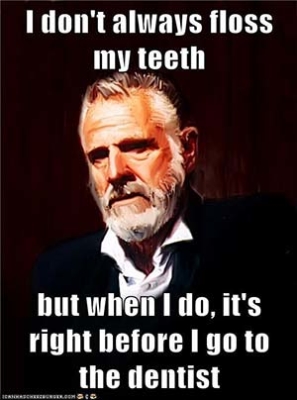 And of course, you SHOULD actually floss your teeth more than a couple times the week before your dental check-up. 🙂 Flossing is critical for getting in between the teeth where food gets stuck, and if you don’t get that out, the bacteria between your teeth will have a party and eat into the sides of the teeth. It can be difficult or impossible for you or your dentist to see this decay without x-rays, so if you don’t get regular check-ups, those cavities can get really big before you know about them.
And of course, you SHOULD actually floss your teeth more than a couple times the week before your dental check-up. 🙂 Flossing is critical for getting in between the teeth where food gets stuck, and if you don’t get that out, the bacteria between your teeth will have a party and eat into the sides of the teeth. It can be difficult or impossible for you or your dentist to see this decay without x-rays, so if you don’t get regular check-ups, those cavities can get really big before you know about them.
Do Homemade Dental Products Work?
Simple answer? No, homemade dental products don’t work very well, mostly because it’s hard to put the important ingredients together in a way that works and tastes good. And if you don’t use helpful ingredients, but try to come up with your own stuff, very often you’ll do more harm than good. Baking soda, for example, is good at scrubbing away plaque because it’s abrasive, but if you use too much, too long, you can actually brush away your enamel and do real damage. Basically, the best products to use are the ones made by the big companies, because they’ve put a lot of work into making them just right.
What Products Work for a Dry Mouth?
People with decreased salivary flow usually suffer from a lot more cavities, because our saliva is a really important part of our mouth’s defense against the bacteria that cause decay. Quite a few medications and medical conditions can really dry up your saliva, though, especially many anti-depressants. Radiation for head or neck cancer, or chemotherapy for almost any cancer, can temporarily or even permanently damage your salivary glands, making it even more important to mouth moist with artificial means. You’ll sometimes hear people recommend lemon juice to stimulate the salivary glands, but if you already have a dry mouth, adding acidity will only increase your risk of decay. Bad idea.
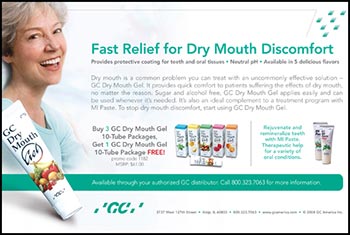 The product that we recommend most is made by GC America, called GC Dry Mouth Gel. As with the Oxyfresh products, this is usually only available through a dental office. To tell the truth, I’m not sure why, but AFAIK that’s the case. The gel comes in a number of flavors, and the really big benefit to the gel is that it lasts for a couple hours with only a small pea-sized amount.
The product that we recommend most is made by GC America, called GC Dry Mouth Gel. As with the Oxyfresh products, this is usually only available through a dental office. To tell the truth, I’m not sure why, but AFAIK that’s the case. The gel comes in a number of flavors, and the really big benefit to the gel is that it lasts for a couple hours with only a small pea-sized amount.
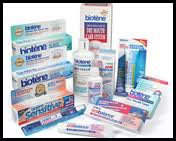 The most common over-the-counter product for dry mouth is called Biotene. You can purchase these products at most pharmacies or grocery stores, or you can buy them online. From what patients tell me, they work pretty well, but the main downside to them is that they don’t last very long, so you have to carry some of the products with you all the time. For women this isn’t quite so difficult, but since men don’t usually carry purses…….not so good. Still, it’s a convenient and affordable option.
The most common over-the-counter product for dry mouth is called Biotene. You can purchase these products at most pharmacies or grocery stores, or you can buy them online. From what patients tell me, they work pretty well, but the main downside to them is that they don’t last very long, so you have to carry some of the products with you all the time. For women this isn’t quite so difficult, but since men don’t usually carry purses…….not so good. Still, it’s a convenient and affordable option.
Look at Your Diet
A little while back, I wrote a blog article about the myth of soft teeth, which is a very common one. The main take-home lesson of that article, if you don’t want to read the whole thing, is that acidity is the biggest cause of tooth decay, and if you can identify sources of acidity in your life and work to reduce them, you can make a big difference in how many, or how few, cavities you get. Some of the most common causes:
- Sodas: yellow sodas seem to be the worst
- Sports/Energy Drinks: Gatorade, Monster, Red Bull, etc
- Acid Reflux/GERD: lots of people have zero symptoms
- Bulimia
- Acidic foods: lemons, limes, grapefruits, oranges, tomatoes, etc.
Get your Regular Dental Check-Up!
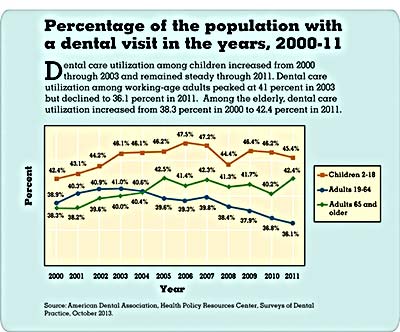 It’s a sad fact, but fewer adults are seeing their dentist for a check-up on a regular basis. While this can seem like a good way to save money in the short run, if cavities have time to get big, they actually get expensive quite quickly. A small filling will run you $100-200, but a big filling can be $200-400, a crown will be $700-1,200, and if you need a root canal, that adds another $700-1,200. Seriously – putting off dental checkups because you’re worried about the cost is NOT the best way to save money.
It’s a sad fact, but fewer adults are seeing their dentist for a check-up on a regular basis. While this can seem like a good way to save money in the short run, if cavities have time to get big, they actually get expensive quite quickly. A small filling will run you $100-200, but a big filling can be $200-400, a crown will be $700-1,200, and if you need a root canal, that adds another $700-1,200. Seriously – putting off dental checkups because you’re worried about the cost is NOT the best way to save money.
And BTW – please don’t use the excuse of “I don’t have dental insurance, so I couldn’t get my teeth cleaned.” You don’t have “oil change insurance,” do you? Or “buy a new phone because I want the newest model insurance,” right? C’mon……you use your teeth every single day of every week of every month of every year of your life; isn’t it worth setting aside a little bit of money to make sure they’re healthy and will last your whole life?
Please don’t hesitate to ask questions or suggest other great products.
You can Request an Appointment Online or call us at 704-364-7069.
We’ll look forward to meeting you soon!
f






